英美概括第八讲 英国文学
英语专八英美文学常识汇总

英语专八英美文学常识汇总3专八人文知识:英国地理概况the english channel: the channel is a narrow sea passage which separates england and france and connects the atlantic ocean and north sea.英吉利海峡:英吉利海峡是一道狭长的海峡,分割英法两国,连接大西洋和北海。
the dee estuary: a small sea ( in irish sea) where the dee river enters.迪河河口:是迪河流入的一个小海。
"the act of union of 1801": in 1801 the english parliament passed an act by which scotland, wales and the kingdom of england were constitutionally joined as the kingdom of great britain.1801合并法:1801年英国议会通过法令,规定英格兰、苏格兰和威尔士根据宪法合并成为大不列颠王国。
gaelic: it is one of the celtic language, and is spoken in parts of the highlands.盖尔语:是盖尔特语言的一种,在高地地区仍有人说这种语言。
the "backbone of england": it refers to the pennies, the board ridge of hills.英格兰脊梁:指的是山脉的背脊。
lead ore: british lead ores have been worked since pre-roman times. it contains silver.铅矿:自前罗马时代开始,英国的铅矿就被开发了。
英语专八英美文学常识(EnglishLiterature)
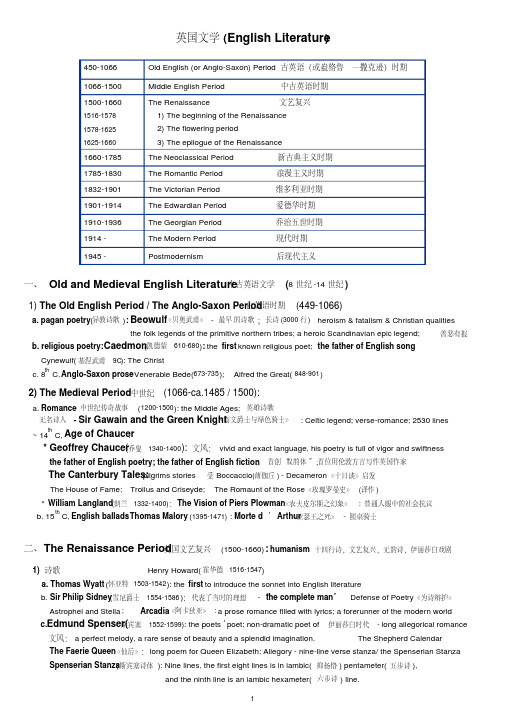
英国文学(English Literature)450-1066 Old English (or Anglo-Saxon) Period 古英语(或盎格鲁—撒克逊)时期1066-1500 Middle English Period 中古英语时期1500-1660 1516-1578 1578-1625 1625-1660The Renaissance 文艺复兴1) The beginning of the Renaissance2) The flowering period3) The epilogue of the Renaissance1660-1785 The Neoclassical Period 新古典主义时期1785-1830 The Romantic Period 浪漫主义时期1832-1901 The Victorian Period 维多利亚时期1901-1914 The Edwardian Period 爱德华时期1910-1936 The Georgian Period 乔治五世时期1914 - The Modern Period 现代时期1945 - Postmodernism 后现代主义一、Old and Medieval English Literature中古英语文学(8世纪-14世纪)1) The Old English Period / The Anglo-Saxon Period古英语时期(449-1066)a. pagan poetry(异教诗歌): Beowulf《贝奥武甫》- 最早的诗歌;长诗(3000行) heroism & fatalism & Christian qualitiesthe folk legends of the primitive northern tribes; a heroic Scandinavian epic legend; 善恶有报b. religious poetry: C aedmon(凯德蒙610-680): the first known religious poet; the father of English songCynewulf(基涅武甫9C): The Christc. 8th C, Anglo-Saxon prose: Venerable Bede(673-735); Alfred the Great(848-901)2) The Medieval Period中世纪(1066-ca.1485 / 1500):a. Romance中世纪传奇故事(1200-1500): the Middle Ages; 英雄诗歌无名诗人- Sir Gawain and the Green Knight《高文爵士与绿色骑士》: Celtic legend; verse-romance; 2530 lines~ 14th C,Age of Chaucer:* Geoffrey Chaucer(乔叟1340-1400): 文风:vivid and exact language, his poetry is full of vigor and swiftnessthe father of English poetry; the father of English fiction; 首创“双韵体”;首位用伦敦方言写作英国作家The Canterbury Tales:pilgrims stories 受Boccaccio(薄伽丘) - Decameron《十日谈》启发The House of Fame; Troilus and Criseyde; The Romaunt of the Rose《玫瑰罗曼史》(译作) * William Langland(朗兰1332-1400):The Vision of Piers Plowman《农夫皮尔斯之幻象》: 普通人眼中的社会抗议b. 15th C, English ballads:Thomas Malory (1395-1471) :Morte d’Arthur《亚瑟王之死》- 圆桌骑士二、The Renaissance Period英国文艺复兴(1500-1660): humanism十四行诗,文艺复兴,无韵诗,伊丽莎白戏剧1) 诗歌Henry Howard(霍华德1516-1547)a. Thomas Wyatt (怀亚特1503-1542): the first to introduce the sonnet into English literatureb. Sir Philip Sidney(雪尼爵士1554-1586):代表了当时的理想- “the complete man”Defense of Poetry《为诗辩护》Astrophel and Stella; Arcadia《阿卡狄亚》: a prose romance filled with lyrics; a forerunner of the modern worldc.Edmund Spenser(斯宾塞1552-1599): the poets’ poet; non-dramatic poet of伊丽莎白时代- long allegorical romance文风:a perfect melody, a rare sense of beauty and a splendid imagination. The Shepherd CalendarThe Faerie Queen《仙后》:long poem for Queen Elizabeth; Allegory - nine-line verse stanza/ the Spenserian Stanza Spenserian Stanza(斯宾塞诗体): Nine lines, the first eight lines is in iambic(抑扬格) pentameter(五步诗),and the ninth line is an iambic hexameter(六步诗) line.2) Prose 散文a. Thomas More(莫尔1478-1535): 欧洲早期空想社会主义创始人Utopia《乌托邦》: More与海员的对话b. John Lyly(黎里1553-160,剧作家&小说家):EupheusEuphuism(夸饰文体): Abundant use of balanced sentences, alliterations(头韵) and other artificial prosodic(韵律) means.The use of odd similes(明喻) and comparisonsc. Francis Bacon (培根1561-1626):英国首位散文家,中世纪至现代欧洲时期; 近代唯物主义哲学奠基人和近代实验科学先驱: the first true English prose classic the trumpeter of a new age;Essays(论说文集):Of Studies, Of Love, Of Beauty3) 戏剧a. Christopher Marlowe(马洛1564-1593): University Wits 大学才子派Edward II;The Jew of Malta《马耳他的犹太人》first made blank verse(无韵诗:不押韵的五步诗) the principle instrument of English dramaThe Tragical History of Doctor Faustus《浮士德博士的悲剧》:根据德国民间故事书写成; 完善了无韵体诗。
英美文化Unit 8
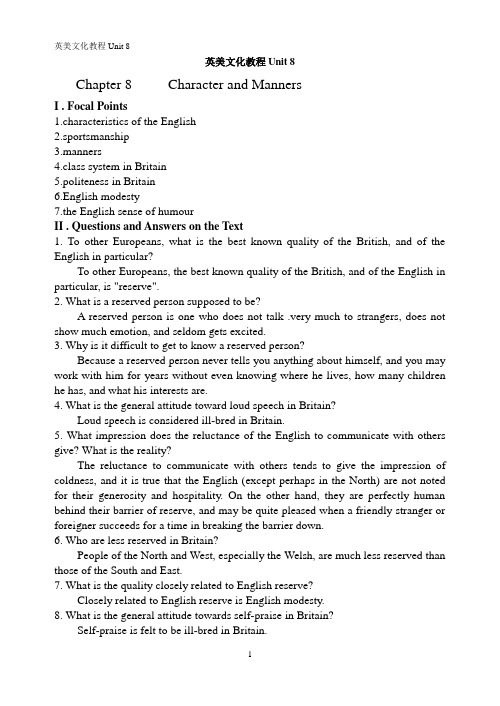
英美文化教程Unit 8Chapter 8 Character and MannersI . Focal Points1.characteristics of the English2.sportsmanship3.manners4.class system in Britain5.politeness in Britain6.English modesty7.the English sense of humourII . Questions and Answers on the Text1. To other Europeans, what is the best known quality of the British, and of the English in particular?To other Europeans, the best known quality of the British, and of the English in particular, is "reserve".2. What is a reserved person supposed to be?A reserved person is one who does not talk .very much to strangers, does not show much emotion, and seldom gets excited.3. Why is it difficult to get to know a reserved person?Because a reserved person never tells you anything about himself, and you may work with him for years without even knowing where he lives, how many children he has, and what his interests are.4. What is the general attitude toward loud speech in Britain?Loud speech is considered ill-bred in Britain.5. What impression does the reluctance of the English to communicate with others give? What is the reality?The reluctance to communicate with others tends to give the impression of coldness, and it is true that the English (except perhaps in the North) are not noted for their generosity and hospitality. On the other hand, they are perfectly human behind their barrier of reserve, and may be quite pleased when a friendly stranger or foreigner succeeds for a time in breaking the barrier down.6. Who are less reserved in Britain?People of the North and West, especially the Welsh, are much less reserved than those of the South and East.7. What is the quality closely related to English reserve?Closely related to English reserve is English modesty.8. What is the general attitude towards self-praise in Britain?Self-praise is felt to be ill-bred in Britain.9. What impression does the English self-deprecation, mixed with their reserve, produce?The English self-deprecation, mixed with their reserve, often produces a sort of general air of indifference which appears to foreigners as a pose, difficult to understand and irritating.10. What is the starting point of the English sense of humour? What is its great enemy?The starting point of the English sense of humour is self-deprecation, and its great enemy is conceit.11. What is the ideal of the English sense of humour?The ideal of the English sense of humour is the ability to laugh at oneself--at one's own faults, one's own failure and embarrassment, even at one's own ideal. 12. What is sportsmanship?Sportsmanship is the ability to practise a sport in obedience to its rules, while also showing generosity to one' s opponent and good temper in defeat.13. How can you prove that sportsmanship as an ideal is applied to life in general?This is proved by the number of sporting terms used in ordinary life.14. Whom does the middle class consist of?The middle class consists chiefly of well-to, do business men and professional people of all kinds.15. Whom does the working class consists of?The working class consists chiefly of manual and unskilled workers.16. What is the most obvious difference between the working class and the middle class according to the author?The most obvious difference between the working class and the middle class is their accent.17. What kind of accent do middle-class people use? What is the characteristic of the accents used by typical Working-class people?Middle-class people use slightly varying kinds of "received pronunciation" which is the kind of English spoken by BBC announcers and taught to overseas pupils, while typical working-class people speak in many different local accents which are generally felt to be uneducated.18. What is one of the biggest barriers of social equality in England as far as education is concerned? Give an example.One of the biggest barriers of social equality in England is the two-class education system. For example, to have been to a so- called "public school" ' immediately marks you out as one of the middle class.19. What is the difference between the life of middle-class people and that of working-class people? Take their meal as an example.The middle classes tend to live a more formal life than working-class people, and are usually more cultured. The midday meal of middle-class people is "lunch" and they have a rather formal evening meal called "dinner", whereas the working man's dinner, if his working hours permit, is at mid-day, and his smaller, late-evening meal is called "supper".20. What is the characteristic of British habits of politeness on the whole?British habits of politeness are on the whole very informal.21. When are handshakes exchanged in Britain?Handshakes are only exchanged on a first introduction, or on special occasions, or as a token of agreement or congratulation.22. What rule is all British politeness based on?All politeness is based on the elementary rule of showing consideration for others, and fitly acknowledging the consideration they show to you.23. When is "Excuse me" used?"Excuse me" is used as an advance apology for troubling some-body, as when passing in front of him or interrupting his conversation, or when putting a question to a stranger.24. What are the functions of "Sorry"?"Sorry" expresses regret for an accidental disturbance or breach of manners. It also takes the place of "no" when you cannot accede to a request or an implied request like "May I borrow your pen?"25. What is the function of "Pardon?"?"Pardon?" is the polite way of asking somebody to repeat what he has said. 26. When are "Yes, please" and "No, thank you" used?"Yes, please" and "No, thank you" are used when somebody replies to an offer.27. How should one express a polite request? What should one say when the request is granted?A polite request does not begin with "I want" or “I think", but with a phrase like "Will (or Would, Can, Could) you please …?" or "Would you mind ... ?" When the request is granted, one should say "Thank you."28. How do British people ask for service that involve real inconvenience?British people do not readily ask each other to do anything that would involve real inconvenience~ If they do ask, the request is accompanied by an implied apology like, "I don't really like ..." or " I asking you, but . or know the trouble I'm causing you, but would you mind ... ?" and so on.29. If you are invited to a person's home in Britain, what time should you arrive?If it is a social occasion, not a business one, it is not polite to arrive early. Ten minutes late is excellent.30. If you are invited to an evening meal in a British home, what time will you probably take your leave?If you are invited to an evening meal in a British home, you will probably take your leave between ten and eleven o' clock..31. What is the main thing about table manners in Britain?The main thing about table manners in Britain is to sit up straight, copy everyone else, gaily asking what to do if you are not sure, and keep the conversation going.32. To whom are tips given in Britain? What is the usual amount of tips given?In Britain, tips are usually given to waiters and taxi-drivers, to whom you give an extra tenth or eighth of the price of the meal or fare. Hotel servants and railway porters, too, expect a small tip if they are of service to you.33. Why should gifts of money be given only cautiously in Britain?Gifts of money should be given only cautiously in Britain because the offer of money makes an act of kindness seem like a mean desire for gain.34. Why is politeness towards women less observed today than it used to be?Because women are now the equals of men in having the vote, taking paid employment and receiving higher education, they receive much less consideration than formerly, for the whole basis of politeness towards women is the feeling that they need protection.35. Give some examples of politeness towards women in Britain.It is considered polite to give up one's seat to a woman who is standing, to open doors for her, help her alight from the bus, carry things for her, protect her from the traffic, and so on, and the maxim "Ladies first" is well known.36. Why are old people respected in Britain?If old people are respected in Britain, it is because they are felt to be in need of protection and support.III. Explanations1. English reserve(1) English reserve is the best known quality of the British, and in particular of the English, to other Europeans. (2) The English are on the whole reserved: they do not talk very much to strangers, do not show much emotion, and seldom get excited. (3) This reluctance to communicate with others is an unfortunate quality in some ways, since it tends to give the impression of coldness.2. English modesty(1) English modesty is a quality closely related to English reserve. (2) Within their heart, the English are perhaps no less conceited than anybody else, but in their relations with others they value at least a show of modesty. (3) Self-praise is felt tobe ill-bred, and the English are typical of self-deprecation.3. English sense of humour(1) English Sense of humour is a quality that is similar to English modesty. Its starting point is self-deprecation, and its great enemy is conceit. (2) Its ideal is to laught at oneself--at one's own faults, one's own failures and embarrassments, even at one's own ideals. (3) It is an attitude to life rather than the mere ability to laugh at jokes. This attitude is never cruel or disrespectful or malicious.4. English sportsmanship(1) Sportsmanship is an English ideal that is highly valued in Britain. (2) Sportsmanship is the ability to practise a sport in obedience to its rules, while also showing generosity to one's opponent and good temper in defeat. (3) Sportsmanship as an ideal is applied to life in general. This is proved by the number of sporting terms used in ordinary speech.5. English class system(1) As a social convention, the English class system is much less rigid than it was, but it still exists below the surface. (2) Broadly speaking, it means there are two classes, the "middle class" and the "working class". The middle class consists chiefly of well-to-do business men and professional people of all kinds; the working class consists chiefly of manual and unskilled workers. (3) The most obvious difference between them is in their accent. The middle classes also tend to live a more formal life than working-class people, and are usually more cultured.。
英美概括第八讲英国文学-PPT文档资料

中世纪英语文学
•Chaucer乔叟 《坎特伯雷故事集》
William Langland
Piers Plowman
威廉· 朗兰 《农夫皮尔斯之梦》
Geoffrey Chaucer (1343----1400) English poet, philosopher, bureaucrat, and diplomat
远古英国文学
中世纪晚期英国文学
早期现代英国文学
19世纪英国文学
20世纪英国文学
Old English Literature
Middle English Literature Early Modern English Literature 19th century English Literature
古英语文学
•Beowulf 《贝奥武夫》
•Cæ dmon 凯得蒙
author date
unknown Produced between the 8th and the early 11th century
Set in Denmark and Sweden
location
story
Beowulf fights three antagonists: Grendel, Grendal’s mother and a dragon, he dead soon after the last battle with dragon
Also called Anglo-Saxon literature, Beowulf 《贝奥武夫》 dmon to the from the mid-5th /Cæ century Norman Conquest of 1066
———————————————————————— the English language in use between the late 11th century and around 1470 when a form of LondonGeoffrey Chaucer 杰弗里 · 乔叟 widespread, it is based English began to become William Langland 威廉· 朗兰 the earliest form being comprehensible to modern readers ———————————————————————— Shakespeare 莎士比亚 / Ben Johnson 本· 约翰逊 Literature produced during the reign/ of Christopher Marlowe 克里斯托弗· 马龙 / Francis Queen Elizabeth I; this period was a Bacon 弗朗西斯· 培根 / John Milton 约翰· 弥尔顿 / flourishing of · literature, esp. drama John Bunyan 约翰 班扬 / Henry Fielding 亨利· 菲尔丁 William Wordsworth 威廉·华兹华斯 / Samuel Taylor Featured by Romanticism, a骚赛 complex Coleridge 柯勒律治 / Robert Southey / Jane artistic, literary intellectual Austin 简· 奥斯丁 / Sirand Walter Scott 司各特 / Mary Shelly 玛丽· 雪莱 / John William Polidori 波里多利 / movement Dickens 狄更斯
英语专八英美文学常识汇总
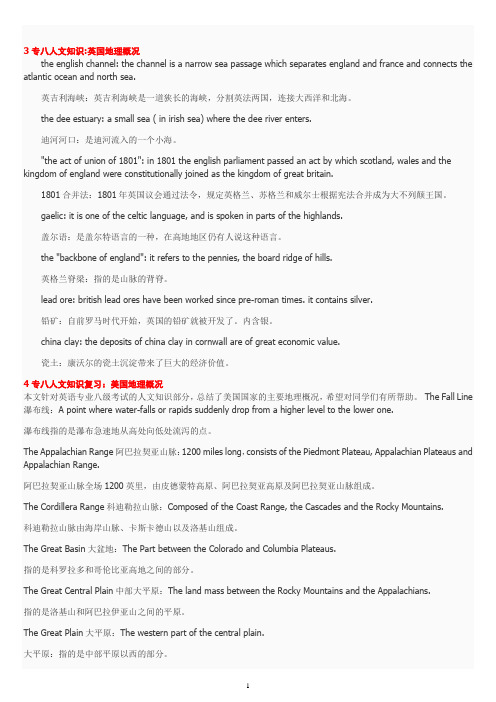
3专八人文知识:英国地理概况the english channel: the channel is a narrow sea passage which separates england and france and connects the atlantic ocean and north sea.英吉利海峡:英吉利海峡是一道狭长的海峡,分割英法两国,连接大西洋和北海。
the dee estuary: a small sea ( in irish sea) where the dee river enters.迪河河口:是迪河流入的一个小海。
"the act of union of 1801": in 1801 the english parliament passed an act by which scotland, wales and the kingdom of england were constitutionally joined as the kingdom of great britain.1801合并法:1801年英国议会通过法令,规定英格兰、苏格兰和威尔士根据宪法合并成为大不列颠王国。
gaelic: it is one of the celtic language, and is spoken in parts of the highlands.盖尔语:是盖尔特语言的一种,在高地地区仍有人说这种语言。
the "backbone of england": it refers to the pennies, the board ridge of hills.英格兰脊梁:指的是山脉的背脊。
lead ore: british lead ores have been worked since pre-roman times. it contains silver.铅矿:自前罗马时代开始,英国的铅矿就被开发了。
英美国家概况Unit 6 British Literature (英国文学)
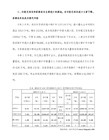
一、本单元重点内容
1. Beowulf {贝奥武夫(一首古英文史诗的名字,同时也是此诗中的英雄的名字)}
2. The Canterbury Tales by Geoffrey Chaucer (杰弗里·乔叟的《坎特伯雷故事集》)
1). British literature concerned with Christianity: Anglo-Saxons’ illustrated versions of the bible: the most famous--- the Book of Kells
2). Beowulf --- a long poem, one of the oldest of these early “Old English”(AD 6th C. —AD 11th C.的盎格鲁˙撒克逊的英语) literary works (古英语文学作品指8th C. AD—11th C. AD)
2. Elizabethan Drama (伊丽莎白一世:1533.9.7—1603.5.24)
---a general flowering of cultural and intellectual life in Europe during 15th and16th C. which is known as “The Renaissance”
7. Charles Dickens (查理·狄更斯)
8. Sir Walter Scott (瓦尔特·司各特)
9. Robert Louis Stevenson (罗伯特·路易斯·斯蒂文森)
10. Modernism (现代主义)
专八英美文学和语言学知识总结
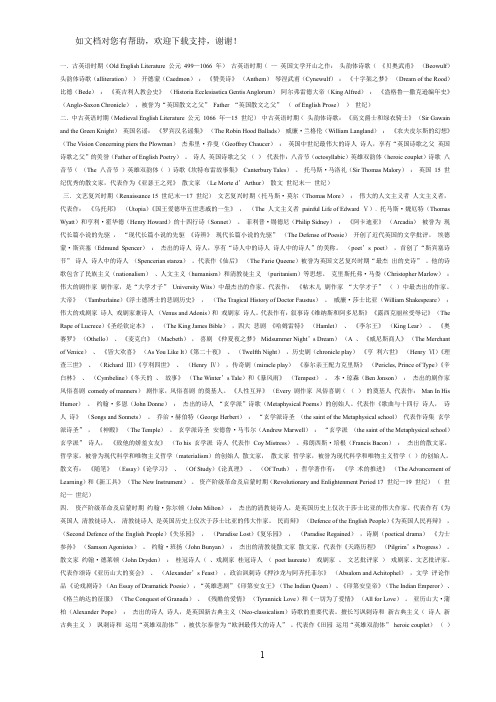
一.古英语时期(Old English Literature 公元499—1066 年)古英语时期(—英国文学开山之作:头韵体诗歌(《贝奥武甫》(Beowulf)头韵体诗歌(alliteration))开德蒙(Caedmon):《赞美诗》(Anthem)琴涅武甫(Cynewulf):《十字架之梦》(Dream of the Rood)比德(Bede):《英吉利人教会史》(Historia Ecclesiastica Gentis Anglorum)阿尔弗雷德大帝(King Alfred):《盎格鲁—撒克逊编年史》(Anglo-Saxon Chronicle),被誉为“英国散文之父”Father “英国散文之父”(of English Prose))世纪)二.中古英语时期(Medieval English Literature 公元1066 年—15 世纪)中古英语时期(头韵体诗歌:《高文爵士和绿衣骑士》(Sir Gawain and the Green Knight)英国名谣:《罗宾汉名谣集》(The Robin Hood Ballads)威廉·兰格伦(William Langland):《农夫皮尔斯的幻想》(The Vision Concerning piers the Plowman)杰弗里·乔叟(Geoffrey Chaucer):英国中世纪最伟大的诗人诗人,享有“英国诗歌之父英国诗歌之父”的美誉(Father of English Poetry)。
诗人英国诗歌之父()代表作:八音节(octosyllabic)英雄双韵体(heroic couplet)诗歌八音节((The 八音节)英雄双韵体()诗歌《坎特布雷故事集》Canterbury Tales)。
托马斯·马洛礼(Sir Thomas Malory):英国15 世纪优秀的散文家,代表作为《亚瑟王之死》散文家(Le Morte d’Arthur)散文世纪末—世纪)三.文艺复兴时期(Renaissance 15 世纪末—17 世纪)文艺复兴时期(托马斯·莫尔(Thomas More):伟大的人文主义者人文主义者,代表作:《乌托邦》(Utopia)《国王爱德华五世悲戚的一生》,(The 人文主义者painful Life of Edward Ⅴ). 托马斯·魏厄特(Thomas Wyatt)和亨利·霍华德(Henry Howard)的十四行诗(Sonnet)。
英美文学(专八)
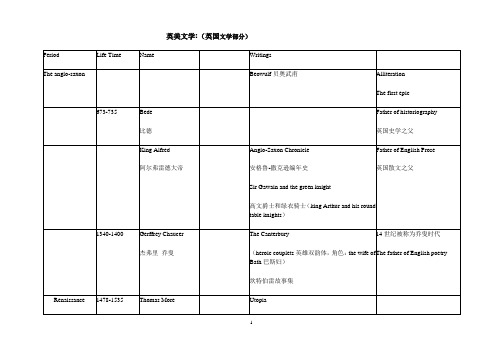
弗兰西斯.培根
Essayer
Essays论说文
Of Studies论学习
Of Truth论真理
现代科学和唯物主义(materialism)的创始人之一
1572-1631
John Donne
约翰.邓恩
MetaphysicalPoet
玄学派诗人
The Sun Rising升起的太阳
London伦敦
Richard Brinsley Sheridan
理查德德.比.谢立丹
Playwright
The School of Scandal造谣学校
The rivals情敌
Comedy of manners
风俗喜剧
Thomas Gray
扥马斯.格雷
Elegy Written in a Country Churchyard墓园挽歌
Joan of Arc圣女贞德
Lake poets
1831桂冠诗人
1788-1824
George Gordon Byron
乔治.戈登.拜伦
Childe Harold洽尔德.哈罗德游记
Don Juan唐璜
Cain该隐
1792-1822
Percy Bysshe Shelley
铂.比.雪莱
Ode to the West Wind西风颂
The picture of dorian grey道林格雷的画像
Lady windermere’s fan温德米尔夫人的扇子
A woman of no’important一个无足轻重的女人
The importance of being earnest认真的重要性
唯美主义(aestheticism)的代表
- 1、下载文档前请自行甄别文档内容的完整性,平台不提供额外的编辑、内容补充、找答案等附加服务。
- 2、"仅部分预览"的文档,不可在线预览部分如存在完整性等问题,可反馈申请退款(可完整预览的文档不适用该条件!)。
- 3、如文档侵犯您的权益,请联系客服反馈,我们会尽快为您处理(人工客服工作时间:9:00-18:30)。
• Much ado about nothing
• Twelfth Night
(1608~1674) 约翰· 密尔顿 English poet, author and civil servant Milton is famous for his epic poem Paradise Lost ,which composed in blank verse
中世纪英语文学
•Chaucer
The Canterbury Tales
乔叟 《坎特伯雷故事集》
William Langland
Piers Plowman
威廉· 朗兰 《农夫皮尔斯之梦》
Geoffrey Chaucer (1343----1400) English poet, philosopher, bureaucrat, and dipl· 哈代 / James Joyce 詹姆斯· From the Victorian era to the end of 乔 伊斯 Thomas Stearns Eliot 20th century 20th/ century, featured艾略特 / William Butler by Modernist Yeats 叶芝 / John Ronald Reuel Tokien 托尔金 / English Literature Movement (JK Rowling) 罗琳 Joanne Murray
Memorial to Cæ dmon, St Mary's Churchyard, Whitby. The inscription reads, "To the glory of God and in memory of Cæ dmon the father of English Sacred Song. Fell asleep hard by, 680"
Piers Plowman , written between 1360-1387, is considered to be of the early great work of English literature. It is a Middle English narrative poem, composed with unrhymed alliterative verse divided into sections called “passus”.
Also called Anglo-Saxon literature, Beowulf 《贝奥武夫》 century from the mid-5th /Cæ dmon to the Norman Conquest of 1066
———————————————————————— the English language in use between the late 11th century and around 1470 when a form of LondonGeoffrey Chaucer 杰弗里· 乔叟 based English began to become widespread, it is William Langland 威廉· the earliest form being 朗兰 comprehensible to modern readers ———————————————————————— Shakespeare produced during 本·reign Literature 莎士比亚 / Ben Johnsonthe 约翰逊 / of Christopher Marlowe 马龙 / Francis Queen Elizabeth克里斯托弗· 约翰·was a I; this period弥尔顿 / Bacon 弗朗西斯· 培根 / John Milton flourishing约翰·班扬 / Henry Fielding 亨利· John Bunyan of literature, esp. drama 菲尔丁 William Wordsworth 威廉·华兹华斯 / Samuel Taylor Featured by Romanticism, a骚赛 / Jane Coleridge 柯勒律治 / Robert Southey complex artistic,奥斯丁 / Sirand intellectual/ Mary Austin 简·literary Walter Scott 司各特 Shelly 玛丽· 雪莱 movement / John William Polidori 波里多利 / Dickens 狄更斯
John Shakespeare's house, believed to be Shakespeare's birthplace, in Stratford-uponAvon.
Four Tragedies四大悲剧
• King Lear 李尔王
• Hamlet 哈姆雷特
• Macbeth 麦克白
significance The way of depiction: the hero travels long distances to prove his strength at impossible odds and beasts which embody supernatural power.
Originally published in 1667, the poem concerns the Christian story of the Fall of Man: the temptation of Adam and Eve by the fallen angel Satan and their expulsion from the Garden of Eden. Milton's purpose, stated in Book I, is to "justify the ways of God to men" and elucidate the conflict between God's eternal foresight and free will.
Shakespeare 莎士比亚(1564-1616)
William Shakespeare was an English poet and playwright, widely regarded as the greatest writer in the English language and the world's preeminent dramatist. He is often called England's national poet and the "Bard of Avon". His surviving works, including some collaborations, consist of about 38 plays,154 sonnets, two long narrative poems, and several other poems. His plays have been translated into every major living language and are performed more often than those of any other playwright.
Blank verse is a type of poetry, distinguished by having a regular meter, but no rhyme. In English, the meter most commonly used with blank verse has been iambic pentameter (抑扬格五音步)
Piers Plowman, a 14th century English dreamversion
中世纪英语文学
Shakespeare 莎士比亚 / Ben Johnson 本· 约翰逊 / Christopher Marlowe 克里斯托弗· 马龙 / Francis Bacon 弗朗西斯· 培根 / John Milton 约翰· 弥尔顿 / John Bunyan 约翰·班 扬 / Henry Fielding 亨利· 菲尔丁
Cæ dmon 凯得蒙 • the earliest English Poet whose name is known • an accomplished and inspirational religious poet
• Cæ dmon's only known surviving work is Cæ dmon's Hymn, the nineline alliterative vernacular praise poem in honor of God which he supposedly learned to sing in his initial dream.
远古英国文学
中世纪晚期英国文学
早期现代英国文学
19世纪英国文学
20世纪英国文学
Old English Literature
Middle English Literature Early Modern English Literature 19th century English Literature
诗行 抑扬格(iamb, iambic.) 音步(Foot) 一诗行不一定是一个完整的句子。 如果一个音步中有两个音节,前者为轻,后者为重,则这种音步 英诗中重读与非重读音节的特殊性组合叫作音步。一个音 英文诗每行的第一个字母都大写,但是一诗行不一定是一个完整的句子, 叫抑扬格音步,其专业术语是。轻读是“抑”,重读是“扬”,一轻 步的音节数量可能为两个或三个音节,但不能少于两个或多于 不一定能表达一个完整的意思。有时候,一行诗正好是一句,有时两行甚至 一重,故称抑扬格。 三个音节,而且其中只有一个必须重读。分析英诗的格律就是 许多行才构成一个意思完整的句子。前者叫end-stopped line(结句行), 英语中有大量的单词,其发音都是一轻一重,如adore, excite, 后者叫run-on line.(跨行句)。这是英文诗与中国诗的最大区别之一。中国 将它划分成音步,并区分出是何种音步以及计算音步的数量。 above, around, appear, besides, attack, supply, believe, 诗歌都是一行表达一个完整的意思。看下面一节诗: 这种音步划分叫scansion。根据一首英诗组成的音步数量,每 return等,所以用英语写诗,用抑扬格就很便利。也就是说,抑扬格 I shot an arrow into the air, 一诗行一个音步称“单音步”(monometer);每一诗行有两 很符合英语的发音规律。因此,在英文诗歌中用得最多的便是抑扬格, It fell to earth, I knew not where; 个音步的,称“双音步”(dimeter);含有三个音步的,称 百分之九十的英文诗都是用抑扬格写成的。 For, so swiftly it flew, the sight
